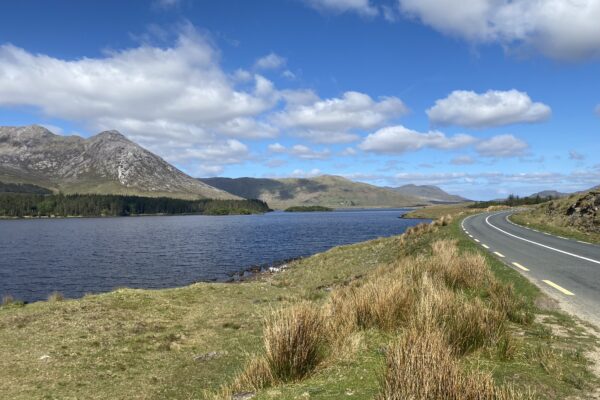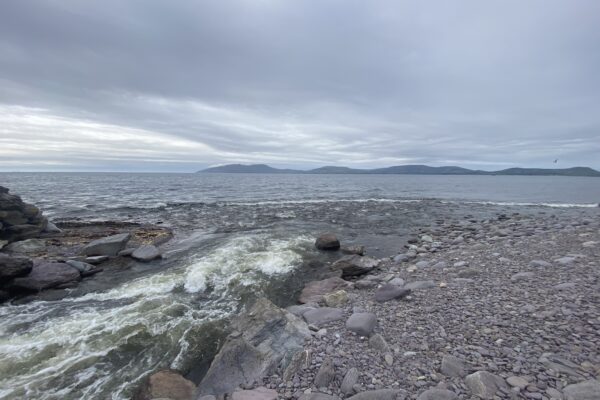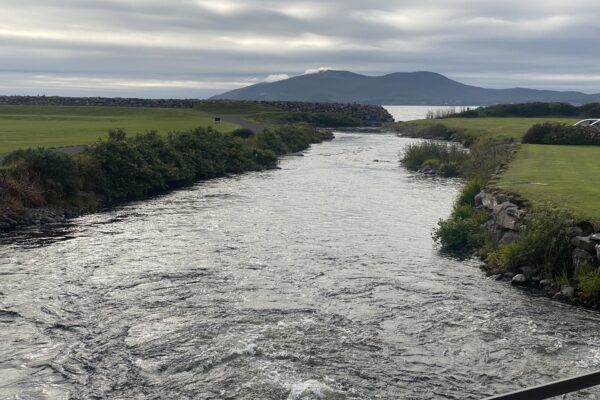-
Newsletter Number 27 – 16 December 2025 Salmon Watch Ireland
We are writing to share our latest newsletter, which focuses on the urgent need to curtail salmon exploitation and the importance of the tagging measures announced by Inland Fisheries Ireland. The newsletter outlines the biological necessity of maximising the number of salmon reaching the spawning grounds in light of the continued and severe decline in salmon stocks. It highlights why maintaining adequate spawning escapement is fundamental to stock recovery, genetic integrity, and long-term resilience, and why precautionary management measures are essential at this time. We also emphasise that exploitation controls alone are not sufficient. A proactive and coordinated response is required both nationally and internationally to address the many pressures affecting salmon throughout their life cycle. We therefore ask all stakeholders to support the exploitation and tagging measures introduced by Inland Fisheries Ireland as part of a wider effort to safeguard this species. We would like to thank all those who continue to engage constructively and support these necessary actions. Your cooperation is vital to ensuring that enough spawners remain to protect and restore Atlantic salmon populations for the future.
Continue reading -
Conference Proceedings – Salmon Watch Ireland, Athlone 11 October 2025
This special conference edition — “Protecting Wild Salmon: Science, Stewardship, and Accountability” — captures the key discussions and outcomes from our 2025 Athlone Conference. Inside you’ll find: Science and Survival: Dr. Elvira de Eyto on seven decades of data from Burrishoole, and Dr. Paddy Gargan confirming the clear link between sea lice and salmon mortality. Grassroots Action: Maura Brennan’s Nore Vision project showing the power of community-led stewardship. Policy and Law: Emma Armshaw (SWAN) on the incompatibility of open-net salmon farming with EU clean-water directives. A Call to Action: From pollution reporting to citizen science — discover how you can make a difference. Thank you for your continued support in protecting Ireland’s wild salmon. Newsletter Number 22 Final
Continue reading -
Fish Counter Report and Update Blackwater
This issue contains a brief outline of the fish counter report for 2024 issued by Inland Fisheries Ireland as well as an update on Blackwater fish kill. We have strongly suggested that certain issues come to the forefront in regard to WWTP and Industrial discharges in all catchments and that climate resilience should be built into any existing discharge licenses. We have also highlighted the astonishing number of cattle in County Cork, with a considerable portion in the Blackwater valley. All these factors must be addressed before the long term future of the Blackwater can be put on a sound footing.
Continue reading -
Unprecedented Fish Kill – Munster Blackwater
The recent fish kill on the Munster Blackwater highlights just how fragile the habitats of salmon and trout truly are. These weakened ecosystems are highly vulnerable, and without decisive action, further incidents are inevitable. Although the exact cause has not yet been identified, the deteriorating condition of many rivers—particularly in regions of intensive agriculture and, most notably, dairy farming—has long been a matter of serious concern. This devastating event serves as yet another reminder that urgent steps must be taken to reduce human impact on our waterways. While the possibility of an acute pollution incident cannot be ruled out, it is vital that every potential source is thoroughly investigated, including industrial and municipal discharges. Moreover, the terms under which discharges to surface waters are permitted must be reconsidered in light of changing climatic conditions. In particular, the ability of rivers to assimilate pollutants during periods of low flow and warmer temperatures needs to be carefully assessed. Issue Number 19
Continue reading -
Munster Blackwater – Fish Kill
Press Release Salmon Watch Ireland Expresses Deep Concern Over Major Fish Kill on the River Blackwater Salmon Watch Ireland is alarmed at the scale and extent of the recent fish kill on the River Blackwater. This tragic event highlights the ongoing pressures on the catchment, which continues to suffer from excessive nutrient inputs linked to agricultural intensification and inadequate wastewater treatment infrastructure. In addition, several licensed discharge points associated with dairy processing and other industries contribute further stress to the river system. While such licences may be deemed acceptable under normal conditions, the reality of increasingly frequent low rainfall and higher water temperatures significantly reduces the river’s capacity to assimilate these discharges. Current conditions have already resulted in extensive algal growth on the riverbed. The subsequent die-off of this algae can rapidly deplete dissolved oxygen, causing major mortality among fish and the invertebrate species that sustain the ecosystem. Elevated water temperatures compound this oxygen loss. Fish weakened under such stressful conditions are also far more vulnerable to secondary impacts such as fungal infections, further accelerating mortality and undermining the long-term resilience of populations. Salmon Watch Ireland believes this incident underscores the urgent need to address the Nitrates Derogation within the catchment and to review the licensing terms for discharges to surface waters. A comprehensive, catchment-wide remediation strategy is required, with full involvement of all stakeholders, if the ecological integrity of the Blackwater is to be restored. We await the outcome of tests being carried out by the relevant state agencies and call for full clarity on the causes of this ecological disaster.
Continue reading -
Salmon Watch Ireland notes the recent online discussions regarding the by catch of salmon by industrial scale pelagic fisheries. We certainly agree that these pelagic fisheries are not being fished in a sustainable manner and the prospect of significant bycatch is certainly cause for concern.
Continue reading -
NASCO – Press Release
Wild Atlantic Salmon in Crisis: Urgent Action Needed Wild Atlantic salmon are in serious trouble. Across the northern hemisphere, their numbers are falling fast. The North Atlantic Salmon Conservation Organization (NASCO) is the only intergovernmental body with the remit to protect these fish. NASCO brings together countries to work on conserving, restoring, and managing wild Atlantic salmon. At NASCO’s recent Annual Meeting in Cardiff from 3 – 6 June 2025, 22 accredited environmental NGOs joined the discussions and played a key role in shaping future plans. The Alarming Reality Experts at the meeting delivered stark warnings: The International Council for the Exploration of the Sea (ICES) reported that in 2023 and 2024, most countries saw record-low numbers of salmon returning to their rivers. The lack of recovery across the North Atlantic points to major environmental pressures in the ocean that are harming salmon on a large scale. Two upcoming scientific studies are expected to reveal that wild salmon populations are being genetically weakened by interbreeding with farmed salmon This “introgression” is seen as one of the biggest threats to wild salmon survival and its ability to adapt to climate change and other environmental pressures. Recognising Positive Steps Despite the grim news, there were some bright spots: Greenland has successfully reduced its catch to below agreed limits, helping protect wild salmon that migrate from Europe and North America to feed in its waters, before returning home to spawn Norway has made major progress in eradicating the deadly parasite Gyrodactylus salaris from 48 of its 54 infected rivers 3 . NGOs Call for Stronger Action Throughout the meeting, NGOs pushed hard for NASCO to raise its ambitions. They argued that the strategic goal of merely “slowing the decline” of wild salmon is not enough. They were very disappointed that NASCO did not show capacity to change this goal based on the latest ICES report. Robert Otto from Atlantic Salmon Federation, co-Chair of NGO group, said: “If ever there was a time for urgent action to save Atlantic salmon, it is now. We hoped NASCO would exhibit the leadership of the moment and respond commensurately to the challenge before the NASCO attendees collectively.” Nils Olav Gjone, Norwegian Salmon Rivers, co-Chair of NGO group, said: “As NGOs, we’re not idealists—we’re scientists and fisheries experts. We understand the scale of the challenge ahead to restore thriving wild salmon populations. We will continue to work to reverse the decline of this magnificent fish across the North Atlantic.” John Murphy, Salmon Watch Ireland said: "Atlantic salmon in Ireland are facing a devastating and critical decline, and we are at a pivotal moment. This is a time for all stakeholders—communities, anglers, policymakers, environmental groups, and commercial fishers —to reflect on our collective role in safeguarding this iconic species. Moving forward, we must prioritise conservation over exploitation and work together to implement effective, sustainable solutions. We are confident that, united by a common purpose, the majority will choose to do the right thing." Looking Ahead with Determination NGOs remain committed to the cause. They will continue their own conservation action across the North Atlantic and advocate for stronger protections. They also pledged to support each other more closely and show the leadership needed to turn the tide for wild Atlantic salmon. The goal is clear: to restore thriving wild salmon populations at the heart of healthy, biodiverse ecosystems. It will take urgent, transformative action, which must start now.
Continue reading -
Newsletter Number 13 – 20 May 2025
This newsletter discusses the unique relationship between salmon and pearl mussel. It is in everyone's interest to know the link between these species and how we must keep habitat and water quality in a condition that supports vibrant stocks of both species. We also highlight the recent high temperatures and their potential effect on juvenile salmon. We have also provided a link to the Danish River Skyern and note that a declining trend in catches similar to UK and Ireland appears to be taking place.
Continue reading -
Newsletter Number 11 -Salmon Farm – Concerns
Salmon Watch Ireland Newsletter Deenish Island Aquaculture Update Urgent Concerns Raised by Salmon Watch Ireland Licence Breach: Introduction of Pre-Adult Salmon The recent transfer of fish to the Deenish Island site appears to breach key conditions of the extant aquaculture licence (AQ199). The licence strictly permits the introduction of smolts only—juvenile salmon—up to a cap of 400,000. The recent stocking of 406,450 pre-adult salmon, each averaging 2.155 kg, appears to represent a clear breach of this stipulation. This information was provided on foot of a request for AIE (Access to Environmental Information) to the Department of Agriculture, Food and the Marine.
Continue reading -
Update 21 February 25 – Salmon Monitoring Report
The report was published recently by Inland Fisheries Ireland and is a comprehensive analysis of the program carried out in 2023. This program is concerned with catchment wide electro fishing, estimation of smolt to adult return survival rates and a study of life cycle characteristics in several catchments. The report is extensive and complex and is strongly indicative of trends evident in salmon populations countrywide.
Continue reading







